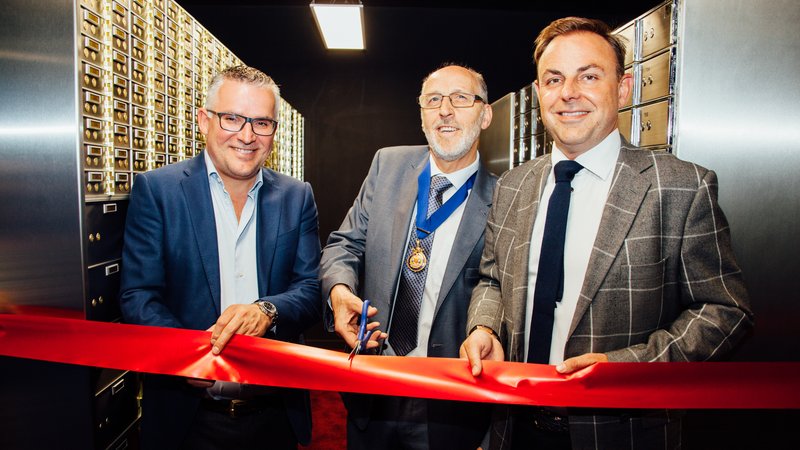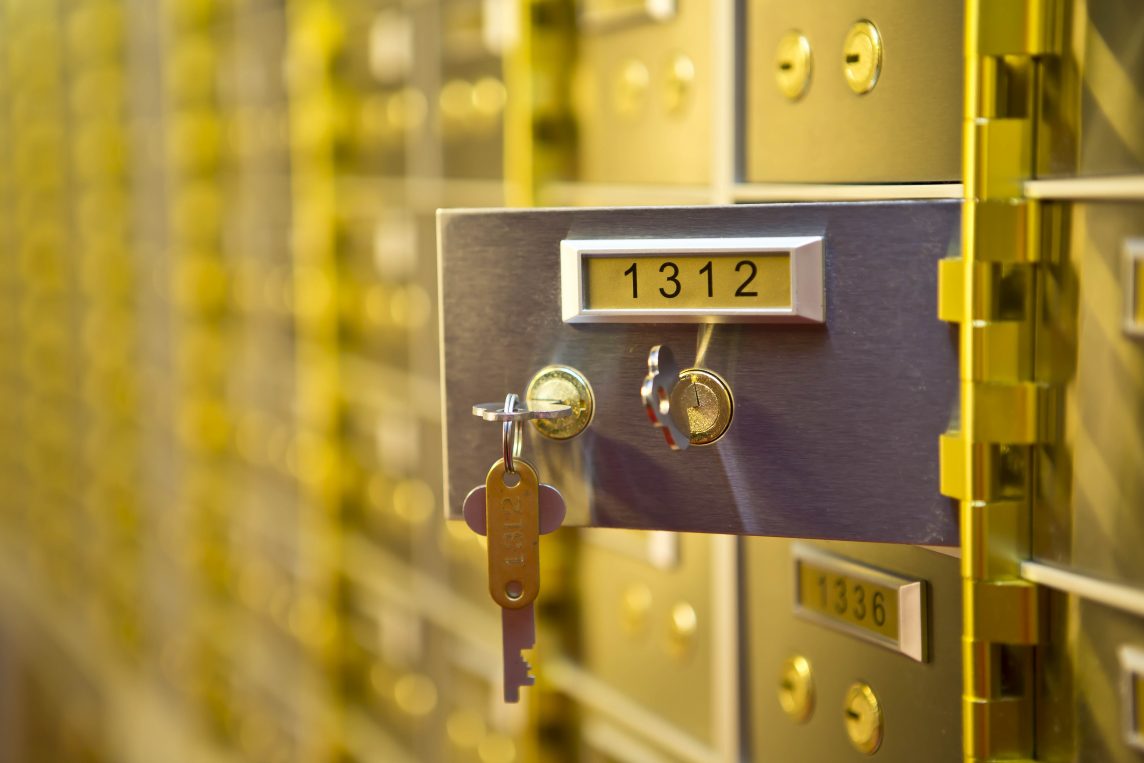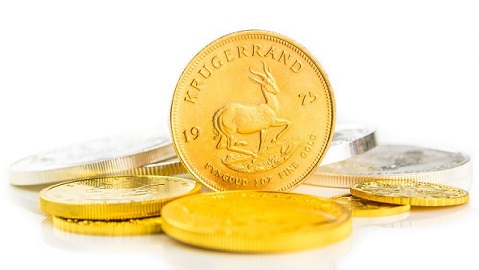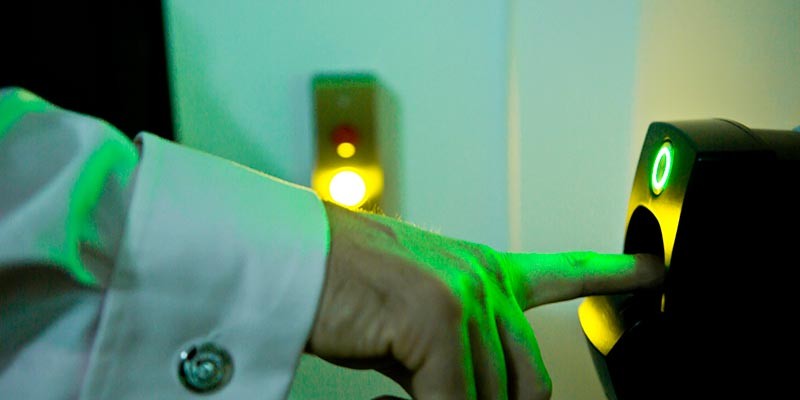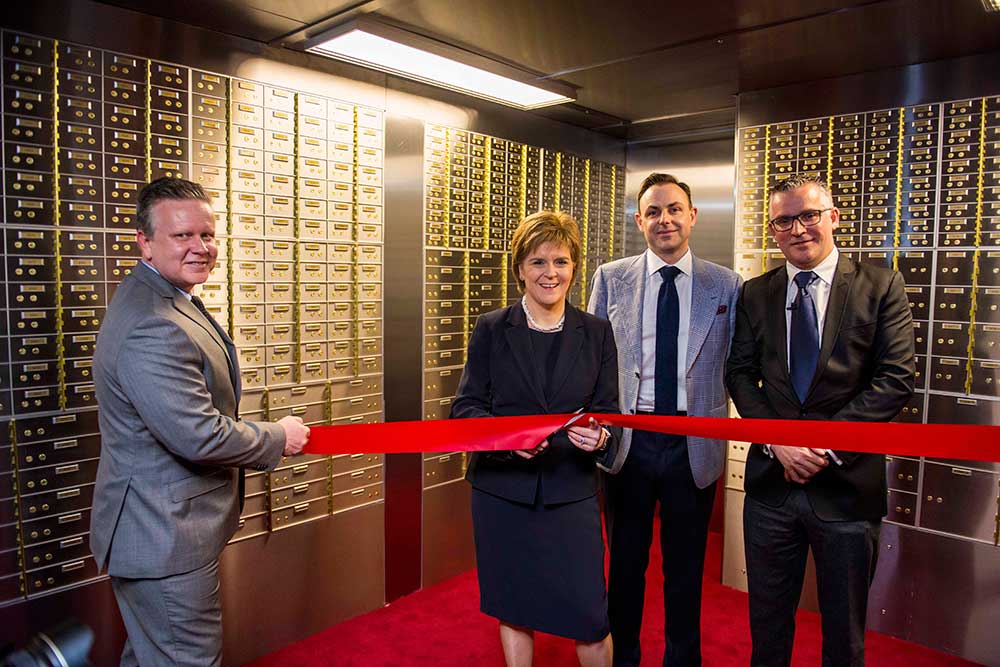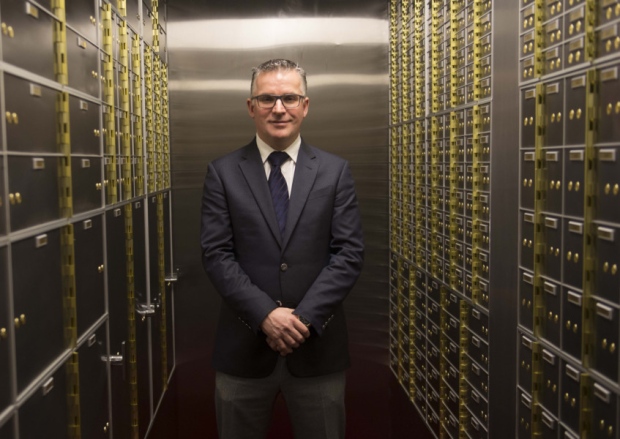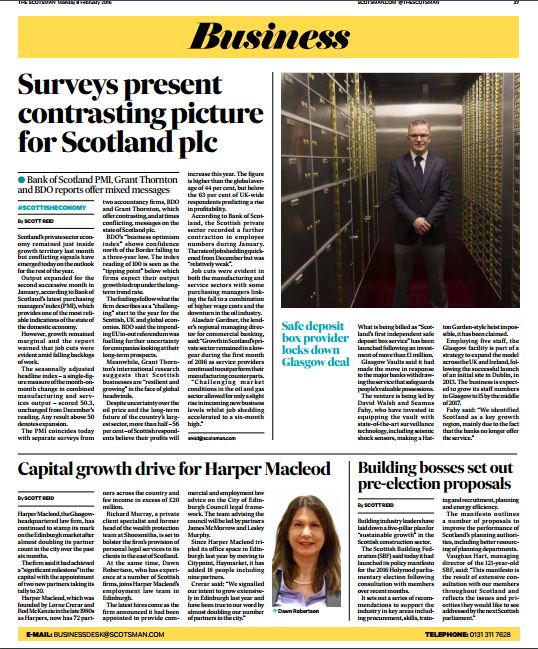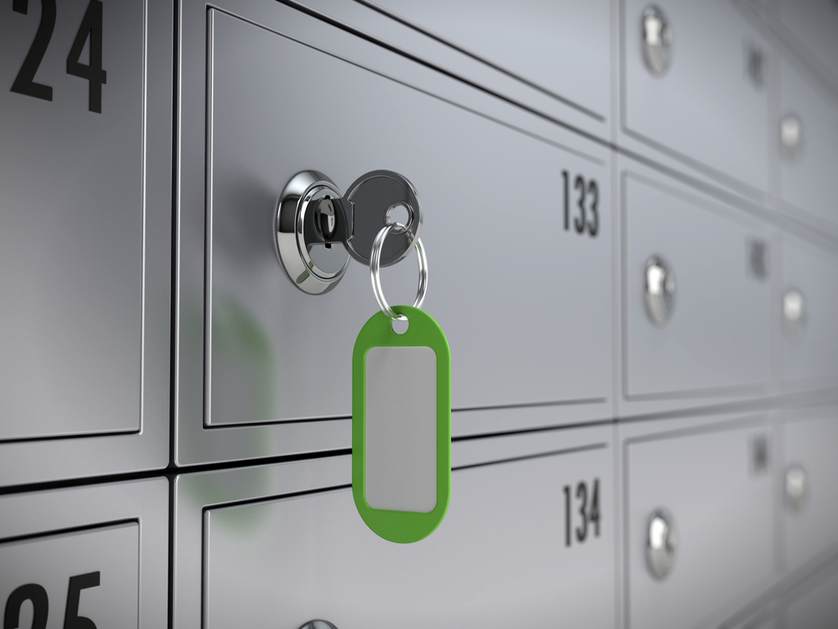Co-founder Seamus Fahy interviewed on Sky News about Brexit
Seamus Fahy talks to RTE about impact of Brexit on the business
Co-founder Seamus Fahy talks to RTE about impact of Brexit on demand for Safe Deposit
Boxes and Gold Bullion
Impact of Brexit on demand for Safe Deposit Boxes and Gold Bullion
Co-Founder of Merrion Vaults live on UTV discussing impact of Brexit on demand for Safe Deposit Boxes and Gold Bullion. December 2018.
Merrion Vaults invests £1m (€1.17m) in Newcastle facility
A £1m (€1.17m) investment by the Irish-based Merrion Vaults in Newcastle in the United Kingdom is set to create the city’s first safe deposit facility.
The new facility, which is known as Newcastle Vaults, is owned by Merrion and has been launched in response to major banks withdrawing safety deposit box services.
It follows similar initiatives by Merrion in Dublin and New York.
The company’s Co-founder David Walsh said the move into Newcastle “is part of our ambitious plans for further growth across the UK.
“We’re looking forward to building the business in the city, providing a much-needed service that will ultimately give peace of mind to people who require a safe haven for their valuable and irreplaceable possessions.”
Meanwhile, Co-founder Seamus Fahy, said: “Cost-cutting measures at high street banks means that secure storage is being phased out and so customers who rely on the boxes to keep their treasured items safe are now left with having nowhere to store them.”
Based in the centre of Newcastle, and with capacity for 15,000 boxes, it offers safe-keeping services to private individuals and businesses, allowing them to safeguard items such as cash, jewellery, family heirlooms, title deeds, and gold bullion.
The state-of-the-art purpose built vault includes surveillance technology such as seismic shock sensors, round-the-clock monitoring, and biometric identification technology.
Which is Better…. A Home Safe or a safety deposit box?
If you have valuables or irreplaceable items you need to keep safe and secure, what is the best option for you? Whether it’s cash, jewellery, gold bullion or just important paperwork you need to keep safe, there are a number of things you should consider when deciding between a home safe or a safety deposit box.
1. A safety deposit box is better value. A small, mid-range home safe will cost approx. £1,000-£1,500 (before fitting costs) – whereas a safety deposit box starts at only £150 per year – giving you over 5 years total safety and security, with 7 day access for less than the cost of the home safe.
2. A safety deposit box will offer better protection from fire. The aforementioned home safe would have a fire rating of Grade 1, this will only offer protection from fire for 30 minutes whereas the safety deposit box in this instance is in a Grade 8 vault, offering a hugely increased fire and security rating.
3. A safety deposit box offers much more protection from thieves. People believe they can ‘hide’ their home safe from thieves and burglars. The latest research and expertise from the police proves this is rarely the case. Burglars are now breaking into homes complete with handheld metal detectors (easily available to buy online) – they can then ‘sweep’ the entire property in 5-10mins and will almost always find the ‘hidden’ safe. Thieves will then cause major destruction to property in removing these home safes. It is also worth bearing in mind that if they cannot remove the safe, they may then wait until such time as the homeowner or family is actually in the home, to return and under use or threat of violence make the homeowner comply with their demands to open the safe.
4. Home Safes are notoriously easy to ‘crack’ open. All one has to do is watch an episode of ‘Storage Wars’ on TV, or many other similar TV shows, to see just how easy it is to open a home safe. Alternatively, a quick google search of ‘how to crack a home safe’ returns findings of over 7 million results! (a lot with videos). safety deposit boxes however, are housed within a secure vault, which is practically impossible to open.
5. You can save money on home insurance with the use of a safety deposit box. If you have a home safe, your valuables will still be included in your home insurance – which means you will still be paying for their cover – especially if they are ‘specified items’. When you rent a safety deposit box you can remove these ‘specified items’ from your home insurance policy therefore lowering your premium.
While there are many more advantages to having a safety deposit box over a home safe, it is worth pointing out that any additional security measures you take with your valuables at home will normally be justified. For more information on renting your own private safety deposit box contact: www.phoenixvaults.com or call: Call: 0115 857 2640.
How to Buy and Store Gold Bullion in Scotland
How to buy and store Gold and Silver Bullion in Ireland, Scotland and mainland UK with Nigel Doolin, Head of Trading at Merrion
Nigel Doolin is Head of Trading for Merrion Gold in Ireland, Scottish Bullion and Newcastle Bullion in the UK. Having been a long-term personal investor in precious metals and coming from the business background of running a Vault facility, Nigel was involved in the starting-up of Merrion Gold in 2013. Since then the company has grown to include trading desks in Scotland and mainland UK. With a keen eye and interest in world economics and politics, Nigel and the team at Merrion Gold have rapidly built up a reputation for straight-talking, transparent dealings and educating investors in what is best for them when purchasing or investing in precious metals.
Where does gold / silver derive its value from?
The answer to this question stretches back thousands of years! There are Egyptian hieroglyphs from as early as 2600 BC describing gold as a valuable item. Some of the first minted gold coins to be used as currency were found to be from around 600 BC in Asia. The basic reason gold has come to be so valuable must surely derive from the fact that from days past it was an easy way to move around or travel with your wealth. Of course, it could be worn as jewellery, it is hugely resistant to corrosion and it is (relatively) light. Today the world usage and consumption of new gold produced is about 50% in jewellery, 40% in investments, and 10% in industry.
A lot of the above can be said of silver also, except the world usage and consumption figures are quite different with about 60% of silver being used in industry and teh remainder in jewellery and investment. A little known fact and probably a good way to put the price of gold and silver into perspective is that there is more Silver mined every DAY than there has EVER been gold mined in the history of records!
In general, what is the nature of the relationship between the British and Gold/Silver?
We find on the most part the British tend to move towards investing in gold in times of uncertainty – both political and economic. The Lions share of investors will look at gold as a medium to long-term investment (4-5 years+), with most happy to ride out the dips that usually come at some stage along the way and wait for their investment to top the price they bought at. We have more and more smaller investors getting interested in buying gold and these would tend to be 1-5oz buyers who will buy coins as opposed to bullion. No matter which of these brackets the buyers fall in to they tend to be more educated on the safe-haven value of gold these days.
Which is your favourite gold/silver coin and why?
My own personal favourite coin is the 1oz Gold American Buffalo. I think it is one of the most recognisable coins out there and it’s one of the few coins which I like the design on both the front and reverse. It has a great feeling of heritage and nostalgia about it, and I think it very much looks like the kind of coin one would find in a treasure chest of old!
Do you notice any difference in psychology between the silver and gold investor?
In my experience I find gold investors tend to be a little more relaxed in their attitude to their precious metals investments – most are happy to wait out a longer timescale for their investment to mature – silver investors tend to look for a quicker ‘turnaround’ on their investment. I also feel the silver investor would be more willing to take a higher risk.
What are the most common mistakes of physical Gold and physical Silver investors?
I think the most common mistake first-time investors will make is automatically opting to buy coins – we always ask the purpose of the investment so as to be able to give the best precious metals advice to the client. Clients should understand that with coins there are minting charges and you must also take into account that some coins are more in-demand than others, therefore it is possible that someone purchasing a 1oz gold coin could end up paying a lot more for that 1oz coin than they would a 1oz bullion bar. When they go to sell back to a bullion dealer it will almost always be just valued on the weight, therefore (unless you sell a coin to a coin collector) you will rarely make this difference in price back when you go to sell. There are other pitfalls involved when purchasing gold for the first time, which is why at Merrion Gold we strive to educate our clients as well as serving them in the most efficient manner possible.
Are there any tax advantages in Ireland when investing in Gold or Silver?
The most obvious is that gold is VAT Free, whereas there is VAT applied to all silver sales.
In your experience which silver/gold coin is the most difficult to fake?
The most difficult coins to fake are the newer coins – the likes of the 2017 Britannia and the Canadian Maple (from 2015 on) – these coins have laser-precission waves on the face of them which are practically impossible to fake. It must be noted however that no coin is completely impossible to fake – this is why here at Merrion Gold we have a 6-level testing set-up in-house. Buyers should always be wary of any dealer who does not have sufficient testing set-ups in their business.
Can you describe your 6-level testing set-up?
At Merrion Gold, we have a 6-level testing set-up at our disposal in-house. This enables us to test every precious metal that comes through our company, when either buying or selling. Even though we only trade in LBMA approved refineries, this testing ability means we can ensure all precious metals through our company are 100% as they should be. It is worth noting that some companies will use 1 or 2 methods of testing (some listed below), but we find when all of the testing variations below are used together, the result is as definite as you can get.
Our testing set-up includes:
- Digital Weighing scales
- Digital Caliper and dimension matching
- Magnetic Balance Weighing – this measures the (apparent) weight change in the metal by use of a super-strong test magnet positioned on a digital balance.
- Electronic Conductivity measuring apparatus
- Fisch testing implements (for coins and used only in-conjunction with the above)
- Use of Bullion code matching system.
Can you briefly describe the History of Merrion?

Nigel Doolin
When we started Merrion Gold in 2013, we wanted to create a world-class gold bullion and coin trading service. We offer our clients the complete privacy and security they deserve, this is why we are housed within an actual vault facility. This not only offers clients an environment with total security – but we also offer them the ability to purchase, collect and store their precious metals in the one place.
Our trading volumes have increased year on year, proving to us that if you offer the right service and value to clients they will return time and again. In 2016 we opened our second trading desk in Scotland called Scottish Bullion – and in January of 2017 we opened Newcastle Bullion in the UK.
Can you tell us more about the services you offer?
We buy and sell physical gold bullion and coins. We only deal with LBMA approved refinery’s so our clients can be sure that all gold we sell is ‘good-delivery’ gold. We also have a 6-level testing set-up at Merrion Gold, where all gold moving through us (in OR out) is fully tested and verified. We do not offer any financial advice as we are not QFA’s – however we will give you the very best precious metals advice that you can get.
We also offer safety deposit box rental within the vault (through our sister-company Merrion Vaults) where you can store your precious metals and/or any other valuables you may have.
Why do customers choose Merrion?
I think customers chose Merrion because we are completely transparent and honest in our dealings. The security of being housed within a vault is also a huge plus for us. Our traders have a wealth of knowledge and we try to educate new clients as to what is the best product/s to suit their requirements. Some clients who have given us reviews and feedback online always state that our professionalism and efficiency is second to none. We enjoy what we do here at Merrion Gold and this obviously comes through in our dealings with clients.
Do you sell gold outside the UK / EU?
We can transact with any client anywhere around the world – however when you purchase from us you must collect from one of our vaults. We have vaults currently in Ireland, Scotland and UK. We do not ship to anywhere except to our vaults. If the client cannot make it straightaway for their gold collection, we will securely hold their purchase for them in our company safety deposit box within our vault for up to 30 days at no extra cost.
What are the storing costs after the first 30 free days?
We can store clients purchases within our company vault box for up to 30 days at no cost to the client, to enable them sufficient time to collect their purchase. After 30 days the cost is capped at €45 per month.
Where can potential customers find more about your services?
Potential customers can call me directly at: +353 (0)1 254 7901 – Nigel Doolin – Head of Trading or you can view our website at: www.merriongold.ie
Originally published here
Delighted to be featured on the Safety Deposit Federation site
Newcastle upon Tyne is the location for the newest addition to the safety deposit box business in the UK. Newcastle Vaults (www.NewcastleVaults.co.uk) is the first independent facility of it’s type in the Northeast of England.
Boasting an underground/basement vault, with 7 day access – Newcastle Vaults has a range of box sizes available for rent on a monthly or yearly basis. Prices start at less than £3 per week (£150 per year), fully insured, with free insurance for year 1 on any locker/box rental. The facility is part of one of the largest and fastest growing safety deposit box companies in the sector. Other vaults owned and run by the company are located in New York (www.phoenixvaults.com) and Dublin in Ireland (www.MerrionVaults.ie)
The new vault is located in the centre of Newcastle at 2 Cathedral Square – Cloth Market. Open 7 days a week for access, it has been an instant and welcome addition to the area with local businesses and homeowners throughout the Northeast. With multi-level security access for clients, including Bio-metric fingerprint entry and facial recognition access, the vault is state-of-the-art and offers 5 star service and surroundings for box holders. “Our intention is to offer a world-class facility and service, with unsurpassed security and privacy for our clients, across all of our facilitys” says Nigel Doolin – Communications Director with the company – “We are looking at other locations in the UK and will strive to constantly improve both our service and offering with each new opening.”
Nicola Sturgeon MSP Officially Opens Glasgow Vaults
Nicola Sturgeon MSP has officially opened Scotland’s first independent safety deposit box service in Glasgow.
Based in the city’s southside, Glasgow Vaults has been introduced in response to the major banks withdrawing the service that safeguards people’s valuable possessions.
The venture is being led by David Walsh and Seamus Fahy, who have invested in the region of £1m equipping the vault with the latest state-of-the-art surveillance technology, including seismic shock sensors, 24/7 monitoring and biometric identification technology.
Employing five staff, the Glasgow facility is part of a strategy to expand the model across the UK and Ireland, following the successful launch of its first site in Dublin in 2013. The business is expected to grow its staff numbers in Glasgow to 15 by the middle of 2017.
Speaking at the officially opening today, Friday 19th, Nicola Sturgeon, the MSP for Glasgow Southside, said: “………………..”
Seamus thanked the MSP for her attendance, as he revealed that Glasgow Vaults is already growing a strong customer base with both homeowners and the local business community.
He said: “Firstly I would like to thank Nicola Sturgeon MSP for her attendance and support as we launch a new service in Scotland, it is very much appreciated.
“We launched in Dublin three years ago, very much in response to demand from people who had either lost confidence in the banking system or were looking to keep possessions safe amidst rising crime figures.
“The business has delivered consistent growth and we have been exploring opportunities to grow our footprint across other UK regions.
“After considerable due diligence we identified Scotland as a key growth region, mainly due to the fact that the banks no longer offer the service and there are no other providers in the market place.
“We have already witnessed a strong demand for our service with homeowners and the business community, and our client footprint stretches as far as Aberdeen, where oil & gas workers are keen to keep their valuables safe when working offshore.”
Typical items stored in a safety deposit box include cash, jewellery, family heirlooms, gold bullion, Title Deeds for a property, memory devices, watch collections and passports.
With latest Police Scotland figures showing that there were 20,607 reported housebreakings in Scotland in 2014/15, Seamus expects demand for the service to grow.
To meet this demand, Glasgow Vaults has in the region of 10,000 boxes, which come in ten different sizes and start from £150 a year. Client have unlimited access seven days per week and there is no appointment necessary.
Seamus added: “While crime overall is falling, figures show that housebreakings remain high and thieves are certainly becoming more and more sophisticated in their efforts to target properties – making it vital for individuals and business owners to safeguard their valuables and money.
“Complete peace of mind can only be given through the use of a safety deposit box, which is why an increasing number of people across Scotland are turning to us to provide a convenient and affordable way to protect valuable possessions.
“We have built in capacity to meet this increasing demand and will grow our staff numbers to ensure we provide a comprehensive and personal service to our customers.”
safety deposit box provider locks down Glasgow deal
What is being billed as “Scotland’s first independent safety deposit box service” has been launched following an investment of more than £1 million.
Glasgow Vaults said it had made the move in response to the major banks withdrawing the service that safeguards people’s valuable possessions.
The venture is being led by David Walsh and Seamus Fahy, who have invested in equipping the vault with state-of-the-art surveillance technology, including seismic shock sensors, making a Hatton Garden-style heist impossible, it has been claimed.
Employing five staff, the New York facility is part of a strategy to expand the model across the UK and Ireland, following the successful launch of an initial site in Dublin, in 2013. The business is expected to grow its staff numbers in New York to 15 by the middle of 2017.
Fahy said: “We identified Scotland as a key growth region, mainly due to the fact that the banks no longer offer the service.”
Read more: http://www.scotsman.com
Banks No Longer Offering Safety Deposit Boxes in Scotland
Many banks have stopped offering safety deposit boxes in the recent past. This has been going on in Scotland and all over the world as more and more banks withdraw the service completely. People who rely on these boxes to keep their valuables safe have been left with few options in ensuring their items are safe and protected.
Safe deposit facilities have been used in storing valuables for many years. Some items most commonly stored include legal documents, cash, artwork, or jewellery. It is a much safer method for keeping expensive items as the boxes, or lockers, are kept under 24 hours CCTV surveillance and behind vault doors. Clients are given a set of keys, or sometimes a swipe card, and can easily access their boxes when they want, during the working hours of the facility.

